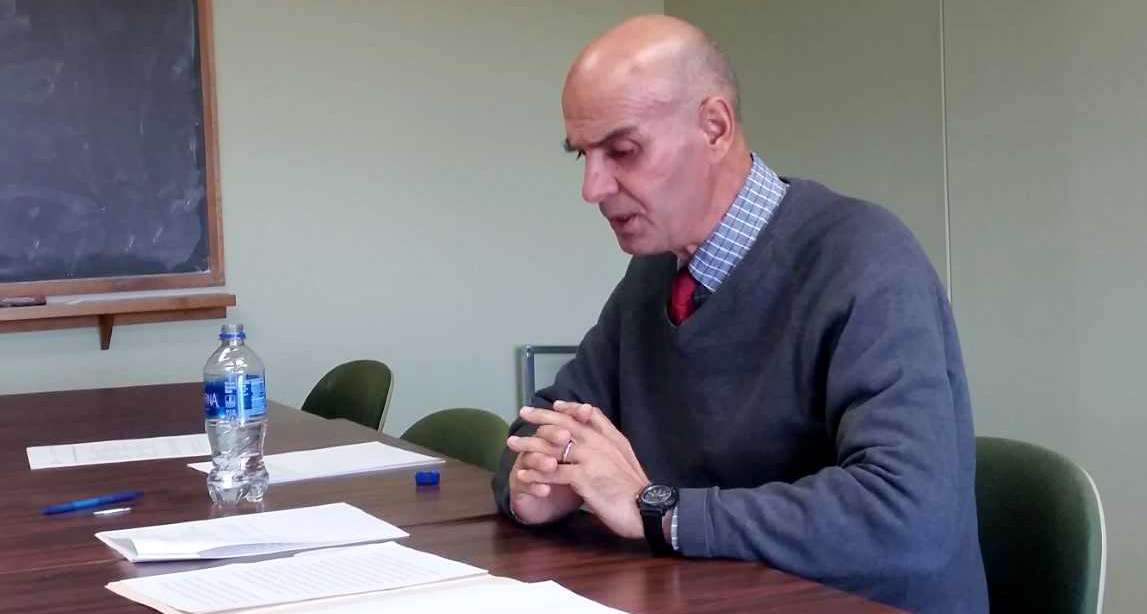Come practice your spoken Latin – everyone is welcome!
October 15 and 29, November 5 and 19, and December 3: 12-1 pm
October 8 and 22, November 12 and 26, and December 10: 3-4 pm
The Latin Table is held in Curtin 866
Come practice your spoken Latin – everyone is welcome!
October 15 and 29, November 5 and 19, and December 3: 12-1 pm
October 8 and 22, November 12 and 26, and December 10: 3-4 pm
The Latin Table is held in Curtin 866
UWM Curtin Hall 866
3243 N Downer Ave
Milwaukee, WI 53211

Join us on Thursday, October 18 at 4:00 pm for the WAMS (Workshop on Ancient Mediterranean Studies) Talk with Prof. Ippokratis Kantzios from the University of South Florida. Kantzios will be presenting “Bodily Pathology and Unhealthy Politics in Alcaeus.”
UWM Sabin Hall G90
3413 N. Downer Ave
Milwaukee, WI 53211
Sunday, November 4, 2018, 3:00pm
Norton Lecture
Eric H. Cline, Professor of Classics, Anthropology, and History, George Washington University
Title: 1177 BC: The Year Civilization Collapsed
Abstract:
For more than three hundred years during the Late Bronze Age, from about 1500 BC to 1200 BC, the Mediterranean region played host to a complex international world in which Egyptians, Mycenaeans, Minoans, Hittites, Assyrians, Babylonians, Cypriots, and Canaanites all interacted, creating a cosmopolitan and globalized world-system such as has only rarely been seen before the current day. It may have been this very internationalism that contributed to the apocalyptic disaster that ended the Bronze Age. When the end came, as it did after centuries of cultural and technological evolution, the civilized and international world of the Mediterranean regions came to a dramatic halt in a vast area stretching from Greece and Italy in the west to Egypt, Canaan, and Mesopotamia in the east. Large empires and small kingdoms, that had taken centuries to evolve, collapsed rapidly. With their end came the world’s first recorded Dark Ages.
It was not until centuries later that a new cultural renaissance emerged in Greece and the other affected areas, setting the stage for the evolution of Western society as we know it today. Blame for the end of the Late Bronze Age is usually laid squarely at the feet of the so-called Sea Peoples, known to us from the records of the Egyptian pharaohs Merneptah and Ramses III. However, as was the case with the fall of the Roman Empire, the end of the Bronze Age empires in this region was probably not the result of a single invasion, but rather of multiple causes. The Sea Peoples may well have been responsible for some of the destruction that occurred at the end of the Late Bronze Age, but it is much more likely that a concatenation of events, both human and natural — including earthquake storms, droughts, rebellions, and systems collapse — coalesced to create a “perfect storm” that brought the age to an end.
Fore more information, visit the AIA – Milwaukee Society website.
Sponsored by the Archaeological Institute of America and the Departments of Anthropology, Art History, and FLL/Classics at UWM
UWM Sabin Hall G90
3413 N Downer Ave
Milwaukee, WI 53211
Sunday, December 2, 2018, 3:00pm
Alan Kolata, Anthropology, University of Chicago
Title: KIngship and Compassion: The Paradox of Jayavarman VII, Emperor of Angkor
Abstract:
After destroying multiple political rivals from neighboring kingdoms in Thailand and Vietnam, the Southeast Asian monarch known as Jayavarman VII (c.1125 to 1218 CE) reigned over the largest geographical expanse ever attained by the Angkorean Empire. Jayavarman VII’s instruments of rule simultaneously deployed extreme violence and profound compassion, brutal warfare and vigorous economic development. This talk will explore the contradictions and paradoxes of Jayavarman VII’s religious “infrastructure of compassion” that, for a time, held the empire of Angkor together, but ultimately fell into desuetude under the burden of its own ideology and the extreme “piety” of its patron. The life history of Jayavarman VII offers insight into the nature of rule and the role of religion in the construction and eventual disintegration of empire.
For more information, visit the AIA-Milwaukee Society website.
Sponsored by the Archaeological Institute of America and the Departments of Anthropology, Art History, and FLL/Classics at UWM